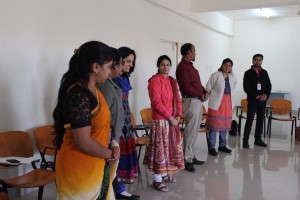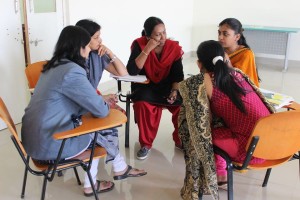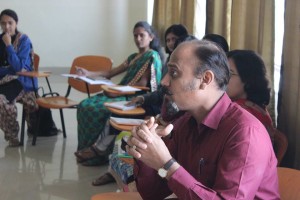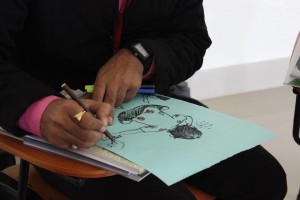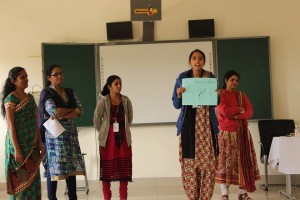The teacher-training workshop at Delhi Public School, Nashik was held on 16 December 2017. The participants came from diverse backgrounds and schools—we had teachers from primary classes, teachers from Maharashtra State board schools, Science, Social Science, English and Art teachers.
We began the workshop with a brief introduction to the Anne Frank project followed by a round of introductions—names, schools and then, the change they want to make in this world. To make it more interesting, we did a slow round first followed by a ‘speed’ round. Naturally there were some fumbles and laughter, but it was an interesting way to get to know more about one another.
We then moved onto the next part of the workshop—a discussion on the relevance of Anne Frank today and how as educators, they would use Anne Frank in the classroom—after an introduction the book itself. This was a group-based activity. Before that, some of the participants who had read the book spoke about how they felt when they read it. One of the teachers said that the book affected her so much that she found it difficult to continue reading it.
After the discussion, each of the groups shared what they had discussed. One teacher spoke about how one can relate the discrimination that was prevalent during the Holocaust with what is happening now, particularly in terms of caste. She also spoke about aggressive nationalism and how that can be so detrimental and also why democracy is important. Again, instances from the book can be used to talk about the difference between Democracy and Dictatorship. The participants also spoke about how they use Anne Frank’s example to talk about hope and optimism and how important it is to be positive. The primary school teachers said that they would use the book to talk about values such as caring, compassion, sharing and kindness to their students. A teacher of science said that she uses the story of Anne Frank to talk about values in her classroom, which was interesting to hear. Value and human rights education can really cut across all subjects and age groups. An economics teacher spoke about how relevant it would be in her classroom: where she could talk about the economic conditions in Germany and how it was one of the primary reasons for Hitler’s victory.
We then presented the PeaceWorks Human Rights Defenders module. The participants each got a copy of the module to look through.
After the short break for tea, we moved onto the session based on identity and social exclusion. The participants were asked to write—one or two words that they would use to describe themselves and one or two words that others would (possibly) use to describe them—on a chart paper. It was interesting to see that some of the participants immediately got up to write, while some had to really think hard about it. We discussed how it is hard to use just one or two words to describe oneself when the reality is so different: our identities cannot be condensed into something so limiting. We are made up of much more.
Following the game based on social exclusion—where the participants formed two groups: one group were the ‘outcasts’ and the other the ones who were not—we discussed social exclusion, labelling and identity and how labelling can lead to social exclusion as in the case of Anne Frank. The game involved the outcasts trying, in whatever way possible, to get into any of the groups that were formed by those who weren’t outcasts. As the outcasts said, it was a very difficult task to get into the groups, some had to use an amount of physical force. The game acts as a model for real life situations where those who are excluded from society for whatever reason try (and are rebuffed) to become part of society. The discussion moved onto how children also face exclusion and how labelling is often a cause of this. The participants again divided up into groups for the next part of the workshop, where each group had to design a campaign against social exclusion using examples that they have seen in their classroom or school.
Very interesting (and doable) campaigns were developed as a result: against labelling, against exclusion on the basis of social standing and against forming opinions without considering the entirety of the situation. The groups developed posters and slogans for their campaigns even working out where the campaign could be taken, for instance, to malls and streets and within the classroom and schools.
We ended with watching the TED talk by Hetain Patel, which so beautifully talks about identities.
–Paroma Sengupta
Learning to Live with Difference: A resource for teachers to engage with high school students in the understanding of human rights and inspiring them to become human rights defenders. This supplementary module serves as a starting point for teachers to build upon using current events and their own creativity.
If you wish to use the module in your school, write to us at peaceworks@seagullindia.com

